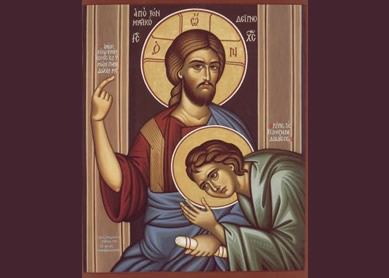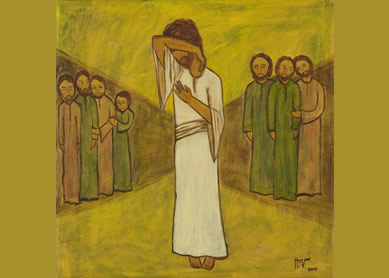The name Lazarus is a transliteration of the Greek word Lazaros, which was derived from a shortened form of the Hebrew name Eleazar. Eleazar, which means “God has helped,” was a popular name in ancient Israel (see, for example, Num 20:25-28) and continued to be popular in early Judaism (Sir 50:27, 3Macc 6:1-15, 4Macc 5:1-23).
How many people in the New Testament are named Lazarus, and is there any connection between them?
Two New Testament individuals are called Lazarus. The first is a poor man in one of Jesus’ parables (Luke 16:19-31). The second is a friend of Jesus and the brother of Mary and Martha, who lived in Bethany, a village near Jerusalem (John 11:1-12:17). Each Lazarus is unique to the gospel in which he appears, and the two Lazaruses are not the same person.
The Lukan Lazarus is a character in a parable, whereas the Johannine Lazarus is a real person. Luke’s Lazarus is poor, whereas the fact that John’s Lazarus has a house (John 12:3) and that his sister Mary anoints Jesus with expensive perfume (John 12:3, John 12:5) implies that he is affluent. Yet there are some interesting connections. Neither man ever speaks, but is rather the subject of conversation within the biblical story. Both men die, and both narratives entertain the idea of returning from the dead. In Luke’s parable, the dead rich man asks Abraham to send Lazarus to warn his brothers about the torments of Hades (Luke 16:27-28). Abraham refuses, saying that people who disregard Moses and the prophets will not listen “even if someone rises from the dead” (Luke 16:31). The resurrection of Lazarus of Bethany, on the other hand, produces a mixed result—while many do believe, others seek to kill both Jesus and Lazarus as a consequence of the resurrection (John 11:45-53, John 12:9-11).
What are interesting aspects of the stories about each Lazarus?
The Lukan Lazarus: The parable involving Lazarus is the only one of Jesus’ New Testament parables in which a proper name is used for a character who does not appear in the Hebrew Bible. This fact, together with Abraham’s role in the parable, encouraged the creation of the name Dives for the rich man. Dives was based on the Vulgate’s rendering of the word “rich” as the Latin word dives.
The parable provides a vivid partial illustration of the eschatological reversal of roles contemplated in the Sermon on the Plain: the poor and the hungry exchange places with the rich and full, with the former receiving the consolation once enjoyed by the latter (Luke 6:20-21, Luke 6:24-25). On earth the poor man Lazarus is desperately hungry, longing for anything that will “fill” his belly, but in the afterlife he receives consolation in Abraham’s bosom (Luke 16:21, Luke 16:25). Dives, like the rich fool (Luke 12:19), lives luxuriously and enjoys “good things,” but in Hades he suffers torment and agony (Luke 16:19-25). Excruciatingly thirsty, he begs for a drop of water to cool his tongue. Abraham denies his plea, doubtless because Dives had failed, day after day, to attend to Lazarus. Nor has Dives any excuse, because he actually knows Lazarus’ name (Luke 16:24). Even the dogs, whose saliva was considered in the Greco-Roman world to be therapeutic, had licked Lazarus’ sores, giving him the care that Dives had failed to render (Luke 16:21).
The Johannine Lazarus: The Fourth Gospel emphasizes the idea that Jesus’ disciples were his friends, whom he loved (John 15:12-15). Strikingly, in the Gospel of John, Lazarus is the first disciple whom Jesus is said to love (John 11:3, John 11:5). Some scholars think that the “Beloved Disciple” of John’s Gospel is Lazarus. Jesus shows his affection for Lazarus by shedding tears at his death (John 11:35). Unlike the Jesus of Matthew (Matt 26:37-38) and Mark (Mark 14:33-34), John’s Jesus is not distressed about his own death—it is his good friend Lazarus’ death that makes him cry. Jesus’ raising of Lazarus from the dead leads to his own death (John 11:46-53), as he “lay[s] down [his] life for [his] friends” (John 15:13).




